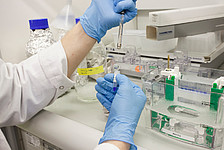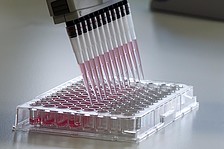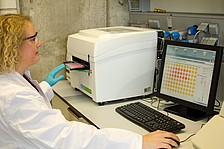Department of Immunology Hohenheim
Innate Immunity - The Frontline of Defence
Almost all cell of our body are capable to induce an inflammatory reaction in responses in infection with microorganisms (such as bacteria and viruses). The main interest of the research conducted in our department is the analysis of the function of a particular group of pattern-recognition-receptors (PRRs) that allow recognition of pathogens and subsequent induction of immune responses in mammals.
PRRs evolved to respond to conserved structures present on microbes that invade mammalian cells. Activation of these receptors is essential for adaptive immune responses such as the generation of antibodies and reactive T cells. However, PRRs also contribute to overreactions of the immune system such as in live-threatening sepsis. Mutations in some genes encoding for PRRs are also associated with severe inflammatory disorders, such as Crohn’s disease. Providing a better understating of the function of these receptors will not only allow us to understand how the immune system works in details, but also help to define new strategies for the treatment and intervention of such diseases.
We are particularly interested in the analysis of a subgroup of PRRs, the Nod-like receptors (NLRs). 22 members of this protein family have been identified in humans, although the function of most of these still remains elusive. The aim of our research is to provide a better understanding of the function of these proteins in the context of immune responses. To this end, we use immunological, biochemical and cell biological techniques and use model infection systems in vitro, such as the enteropathogenic bacterium Shigella flexneri.
Animal models are used to validate the physiological role of NLRs in vivo.



